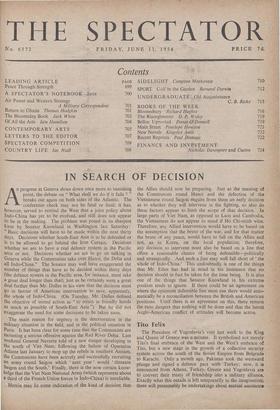IN SEARCH OF DECISION
Asprogress at Geneva slows down once more to vanishing point, the debate on "What shall we do if it fails ? " breaks out again on both sides of the Atlantic. The - conference check may not be fatal or final; it has, however, served to remind the West that a joint policy about Indo-China has yet to be evolved, and still does not appear to be in the making. The problem was posed in its sharpest form by Senator Knowland in Washington last Saturday: "Basic decisions will have to be made within the next thirty days. Decisions whether South-East Asia is to be defended or is to be allowed to go behind the Iron Curtain. Decisions Whether we are to have a real defence system in the Pacific area or not. Decisions whether we are to go on talking in Geneva while the Communists take over Hanoi, the Delta and all Indo-China." The Senator may well have exaggerated the number of things that have to be decided within thirty days (the defence system in the Pacific area, for instance, must take a great deal longer than that), just as he certainly went a great deal further than Mr. Dulles in his view that the decision must go in favour of American intervention to save, apparently, the whole of Indo-China. (On Tuesday, Mr. Dulles defined the objective of united action as "to retain in friendly hands as much as possible of South-East Asia.") But he did not exaggerate the need for some decisions to be taken soon.
The main, reason for urgency is the deterioration in the military situation in the field, and in the political situation in Paris. It has been clear for some time that the Communists are mounting a serious offensive against the Red River Delta. Last Weekend General Navarre told of a new danger developing in the south of Viet Nam; following the failure of Operation Atlante last January to mop up the rebels in southern Annam, the Communists have been actively and successfully recruiting an army round Saigon which 'next year' would 'threaten Saigon and the South.' Finally, 'there is the now certain know- ledge that the Viet Nam National Army (which represents about a third of the French Union forces in Indo-China) is unreliable.
, Herein may lie some indication. of the kind of decision that the Allies should now be preparing. Just as the massing of the Communists round Hanoi and the defection of the Vietnamese round Saigon require from them an early decision as to whether they will intervene in the fighting, so also do these factors appear to limit the scope of .that decision. In large parts of Viet Nam, as opposed to Laos and Cambodia, the Vietnamese do not appear to mind if Ho Chi-minh wins. Therefore, any Allied intervention would have to be based on the assumption that the brunt of the war, and for that matter the brunt of any peace, would have to fall on the Allies and not, as in' Korea, on the local population; therefore, any decision to intervene must also be based on a line that offers a reasonable chance of being defensible—politically and strategically. And such a line may well fall short of the whole of Indo-China.' This undoubtedly is one of the things that Mr. Eden has had in mind in his insistence that no decision should in fact be taken for the time being. It is also one of the things that Senator Knowland in his extreme position tends to ignore. If there could be an agreement on where the optimum defensible line must run there would auto- matically be a reconciliation between the British and American positions. Until there is an agreement on this, there remain the twin dangers that nothing will be done and that the latent Anglo-American conflict of attitudes will become active.


































 Previous page
Previous page